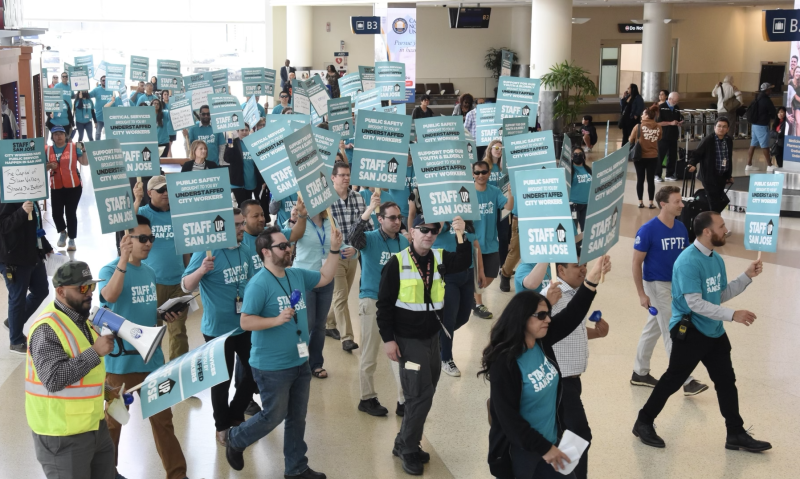“It’s simply not true that San José is less competitive,” said Mahan. “If you look at the city of Santa Clara, which has very strong tax revenue and the ability to pay more than the city of San José for many roles, their current vacancy rate is nearly 17%. Ours is closer to 13%.”
The unions are asking for wage increases over the next three years, including 7% in the first year, 6% in the second year and 5% in the third year.
The city is offering 2% less: 5% in the first year, 4% in the second year and 3% in the third year. The unions also want eight weeks of paid parental leave, while the city is offering four.
A wage increase comparison survey from the city of San José of 16 other comparable cities and counties shows that San José’s proposal would make MEF worker wage increases slightly above average for the first year and slightly below average for the second.
A similar survey for proposed IFPTE wage increases shows the raises would be slightly above average for the first two years. Survey results for both unions for the third year are still largely incomplete.
Still, in a statement on their website, MEF refutes the accuracy of the survey, saying “the City fails to point out what every staff person working for the City already knows, that in most cases, those agencies pay much more than San José to begin with.”
San José has not seen a government employee strike since 2007, when city building inspectors staged a nearly two-week strike.
“A strike could not only impact summer travel, it would impact the ability of 911 and fire response times, and the ability for parks to be cleaned up and libraries to operate,” said Jean Cohen, executive officer of the South Bay Labor Council. “It’s a big deal to go on strike, and we’d like to see the mayor take it equally as seriously so we can avoid one.”
MEF Vice President Rovetto admits that the 2% difference in wages currently stalling the contract negotiations likely won’t be enough to improve staffing and retention at the city.
“I do not believe that 2% is going to be the thing that stops employees from leaving, but I think it is going to be a huge step forward to addressing this problem,” said Rovetto, who adds that he has co-workers who sleep in their cars because they can neither afford to live in the city where they work nor commute back to their home on a daily basis.
The next step in negotiations is for both unions to enter into mediation with the city, assisted by the Public Employment Relations Board. Mediation is scheduled for July 12 with MEF and July 14 with IFPTE members.
“I certainly hope that our labor partners are willing to come to mediation with an open mind, and that the city’s offer is fair and is balancing the needs of both our employees, our residents and our taxpayers,” said Mahan.
But on the same day that MEF enters mediation, they are also planning a “strike school” to prepare members to strike if needed.
A union official says nearly 1,000 union members have signed a petition indicating they are ready to strike.
“I do believe our members are at the point where that 2% is something they are more than willing to fight for,” said Rovetto. “I can only speak from my understanding of conversations that I’ve had with members, but I think [striking] is something that is a very realistic possibility if 2% is that sticking point.”
July 16: An earlier version of this story stated San José had not had a government employee strike in over two decades. This story has been corrected to reflect that there was a strike in 2007.
